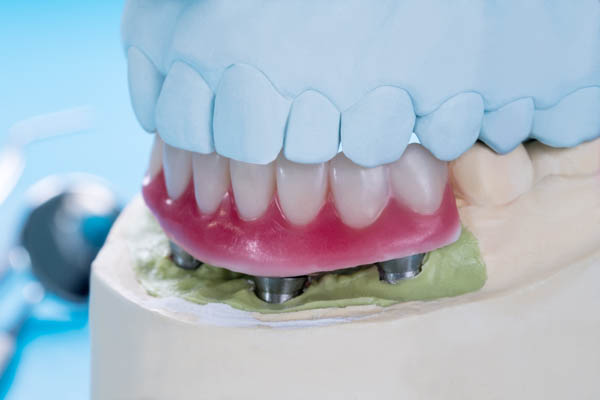Implant Supported Dentures vs. Conventional

Implant supported dentures give you a more comfortable experience than traditional dentures. These prosthetics combine the affordability of conventional dentures with the stability and bone preserving properties of implants.
Dentures are the most economical way to replace missing teeth, particularly when you have already lost most of your teeth. Their installation is non-invasive and the process can be completed in as little as two weeks.
Implants are the priciest way to replace missing teeth, but they also provide the most benefits. Implants are inserted into bone tissues in the jaw and they fuse with these tissues via osseointegration. This makes implants virtually as stable as real teeth, and they transfer bite forces into the jaw, keeping tissues there healthy and preventing the bone tissue loss that occurs when teeth fall out.
The price of implants rules them out as an option when a person has lost most of their teeth. A single implant can cost more than an entire set of dentures.
What to expect when getting implant-supported dentures
Many of those who opt for implant-supported dentures have already tried traditional dentures. Many of them seek a more stable alternative. Traditional dentures rest on the wearer’s gums and they are held in place via suction and dental adhesives. This is not enough to lead to a stable fit, so the prosthetic tends to shift in the mouth when worn.
This often leads to sores forming on soft tissues in the mouth. It can also make it challenging to speak or eat while wearing dentures. For some unfortunate souls, the poor stability of dentures can even lead to the prosthetic falling out while eating or speaking.
Eligibility
The installation of implants requires minor oral surgery. To be eligible for these prosthetics, patients should be healthy enough to recover from the stresses surgical treatments place on their bodies. Those with health conditions like diabetes or immune system disorders might not be eligible for implants. The same goes for people who take medications that can hinder blood clots.
Patients should be willing to give up habits like drinking and smoking before getting implants since these can also slow down the recovery process. Implants are placed in bone tissues in the jaw so patients need to have enough thickness there to hold implants in place. Bone grafts can be used to thicken the jaw of patients who have already lost bone tissues due to their teeth falling out.
The process
Getting implant-supported dentures often involves the dentists placing two to four implants on each half of the jaw being fitted. These implants are strategically placed in locations where the patient’s jawbone tissues are thickest. The implants are given up to six months to fuse with bone tissues around them. Attachments are fitted to the external-facing end of the implants and used to secure dentures in place.
Time for a better solution
Ready to replace your missing teeth? Give us a call or visit our Swampscott clinic to learn more about implant-supported dentures.
Request an appointment here: https://www.bryancousindmd.com or call Cosmetic & Family Dentistry of the North Shore at (781) 443-8268 for an appointment in our Swampscott office.
Check out what others are saying about our dental services on Yelp: Implant Supported Dentures in Swampscott, MA.
Recent Posts
Many people with missing teeth turn to implant dentures for help. If you are tired of living with missing teeth (or no teeth at all), your dentist can help. There are clues that these types of dentures could be the right solution to restore your smile. You can also once again chew and speak properly.…
Implant supported dentures are a great replacement option for those needing a solution for missing teeth. Dentists often recommend them for patients who are replacing an entire arch of teeth, whether that be the top or bottom half. Aside from tooth replacement, there are a few reasons that implant supported dentures are recommended, and improved…
Curious about overdentures? This review discusses what overdentures are and how long you can expect them to last. If you are having issues with your dentures or have yet to start the tooth replacement process and have concerns with the strength and reliability of traditional removable dentures, then overdentures that are supported by dental implants…
Dentures are the traditional tooth replacement solution. Also known as false teeth, dentures are known for being low maintenance and easily accessible. But it may be time for a replacement if the dentures are slipping out, shifting around, or causing pain. This article will help patients better understand the signs of ill-fitting dentures, potential solutions,…


